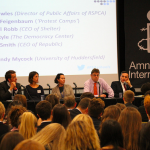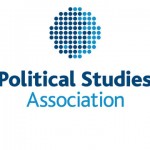On Friday 25 January an audience of seventy-five people gathered in the EBC’s airy 2nd floor lecture theatre to hear a distinguished panel of speakers offer their thoughts on social cohesion in Britain, and on whether the idea of ‘multiculturalism’ which has underpinned much policy and practice in recent years has had its day. Critics of multiculturalism argue that it has impeded integration and increased tensions between different cultural groups. The first speaker, Prof. Ted Cantle of the iCoCo Foundation and the University of Nottingham, argued that a new vision – of interculturalism – was necessary, with more emphasis on transnational identities and on social cohesion. Prof. Ann Phoenix of the Institute of Education agreed, while also stressing our capacity for switching between identities across different sectors of life. Jamie Bartlett of the thinktank Demos reported on research into politics and community relations online, where exchanges between different groups seem to lead to greater polarisation. Jasvinder Sanghera of the national charity KarmaNirvana argued that multiculturalism’s tolerance of some cultural values had brought a failure to challenge oppressive practices such as forced marriage. David Aaronovitch of The Times advised careful use of the word ‘multiculturalism’, which has a multiplicity of definitions, and saw greater interaction between groups as the best way to promote social cohesion. The half-day event ended with a lively and rich discussion between audience and panellists.


 Sparking Political Debate with Sixth Formers: BU Research at the #PSASchools Conference
Sparking Political Debate with Sixth Formers: BU Research at the #PSASchools Conference Political Studies Association: Sport and Politics Conference 2016
Political Studies Association: Sport and Politics Conference 2016










 Beyond Academia: Exploring Career Options for Early Career Researchers – Online Workshop
Beyond Academia: Exploring Career Options for Early Career Researchers – Online Workshop UKCGE Recognised Research Supervision Programme: Deadline Approaching
UKCGE Recognised Research Supervision Programme: Deadline Approaching SPROUT: From Sustainable Research to Sustainable Research Lives
SPROUT: From Sustainable Research to Sustainable Research Lives BRIAN upgrade and new look
BRIAN upgrade and new look Seeing the fruits of your labour in Bangladesh
Seeing the fruits of your labour in Bangladesh ECR Funding Open Call: Research Culture & Community Grant – Apply now
ECR Funding Open Call: Research Culture & Community Grant – Apply now ECR Funding Open Call: Research Culture & Community Grant – Application Deadline Friday 12 December
ECR Funding Open Call: Research Culture & Community Grant – Application Deadline Friday 12 December MSCA Postdoctoral Fellowships 2025 Call
MSCA Postdoctoral Fellowships 2025 Call ERC Advanced Grant 2025 Webinar
ERC Advanced Grant 2025 Webinar Update on UKRO services
Update on UKRO services European research project exploring use of ‘virtual twins’ to better manage metabolic associated fatty liver disease
European research project exploring use of ‘virtual twins’ to better manage metabolic associated fatty liver disease